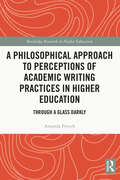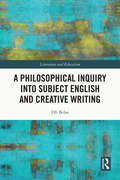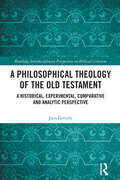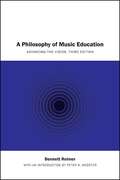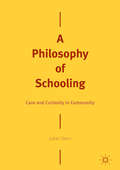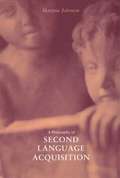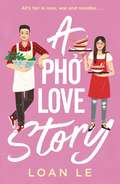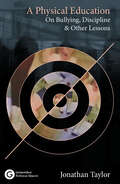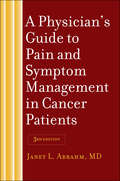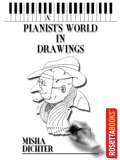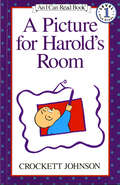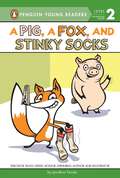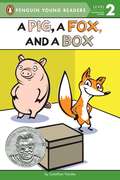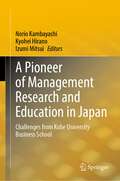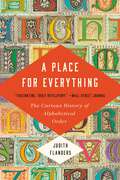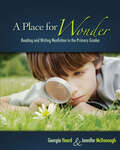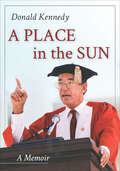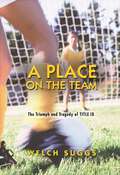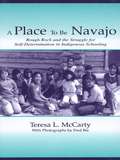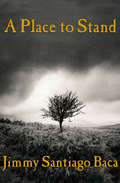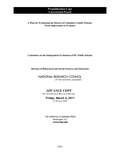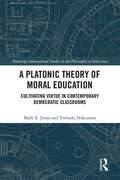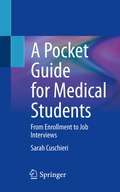- Table View
- List View
A Philosophical Approach to Perceptions of Academic Writing Practices in Higher Education: Through a Glass Darkly (Routledge Research in Higher Education)
by Amanda FrenchThis book takes a philosophical approach to the question ‘what is academic writing?’ and specifically explores the question of how academic writing and writing development can be better understood and developed by lecturers in higher education. It examines how a number of interconnected and interdisciplinary political, linguistic, discursive, ontological and epistemological frameworks can be used to inform a ‘post-qualitative’ approach for research into higher education academic writing practices, employing a Bourdusian/ Deluzean inspired approach. Using lecturers’ own perceptions and experiences of academic writing, and treating them as part of a ‘professional academic writing in higher education habitus’, the book illustrates and analyses a number of ideas and concepts through a broadly post-qualitative paradigm. It also offers a number of innovative academic writing and writing development practices. Offering an in-depth discussion into how lecturers might better negotiate academic writing practices and use their own academic writing experiences to develop students’ writing, this book will be highly relevant to academics, scholars and post-graduate students working in higher education.
A Philosophical Inquiry into Subject English and Creative Writing (Literature and Education)
by Oli BelasWhile engaging with the current political-educational climate of England, this book offers a timely contribution to debates around questions of knowledge in relation to education and school-level English by drawing together theories of individual and disciplinary knowledge. The book provides a philosophical conception of knowledge – as fundamentally embodied at the level of the individual, and a matter of cultural form at the level of shared or "common" knowledge – and an analysis of the implications of this for schooled English. The research draws from various related fields including literary criticism, philosophy (of knowledge and of symbolic form), and phenomenology. The book rethinks general notions of knowledge and lays out the problems that exist within knowledge and language systems in education, especially secondary and university levels. This highly relevant and informative book offers an insightful resource for academics, researchers, and post-graduate students in the fields of education studies, educational policy and politics, philosophy of education, and literature studies.
A Philosophical Theology of the Old Testament: A historical, experimental, comparative and analytic perspective (Routledge Interdisciplinary Perspectives on Biblical Criticism)
by Jaco GerickeAre we able to identify and compare the philosophical perspectives and questions that must be postulated as having been somehow present in the language, ideas and worldviews of the Biblical authors? This book sets out an approach to something that has been generally considered impossible: a philosophical theology of the Old Testament. It demonstrates and addresses the neglect of a descriptive and comparative philosophical clarification of concepts in Old Testament theology, and in so doing treads new ground in Biblical studies and philosophical theology. Recognizing the obvious problems with, and objections to, any form of interdisciplinary research combining philosophical and Biblical theology, this study presents itself as introductory and experimental in nature. The methodology opted for is limited to a philosophical clarification of concepts already found in Old Testament theology, while the findings are presented via the popular thematic approach found in analytic philosophical theologies; with no attempted justification or critique of the textual contents under investigation. These approaches are combined by primarily looking at the nature of Yahweh in the Old Testament. This book offers a new vision of Biblical and philosophical theology that brings them closer together in order that we might understand both more broadly and deeply. As such, it will be vital reading for scholars of Theology, Biblical Studies and Philosophy.
A Philosophy of Music Education: Advancing the Vision, Third Edition
by Bennett ReimerBennett Reimer's A Philosophy of Music Education asserts that the nature and value of music education are determined primarily by the nature and value of music. Originally published in 1970 (with the third edition originally published in 2003), this text relates findings in the field of aesthetics to their implications for the practice of music education, thus emphasizing practical applications that students and future educators can employ in their teaching and learning. It addresses an increasingly diverse world in which music is viewed not as a singular practice but as a multitude of related practices. Reimer believes that music has characteristics that make it recognizably and distinctively a practice or an "art"; that these characteristics can be identified to a reasonable and useful degree (but no doubt never definitively); that music is of value to humans and their communities in a variety of ways related to these characteristics; and that the primary mission of music education is to make musical values widely and deeply available. Each chapter includes case studies ("Riffs") and questions for discussion/exploration ("Etudes") that enhance student learning. This reprint edition includes a new introduction by Peter R. Webster that sets Reimer's work in the context of the development of music education pedagogy and illuminates why this remains an important text for today's students. An excellent introductory text for undergraduate or more advanced music education students, A Philosophy of Music Education remains the best single introduction to this important and growing field.
A Philosophy of Schooling: Care and Curiosity in Community
by Julian SternThis book provides an optimistic account of the value and role of schooling. Schooling is a common but not universal approach to education and has need of its own distinctive justification, in contrast to other approaches such as home-based or work-based education. The book tackles and rejects the various large-scale ‘functional’ theories of schooling which continue to dominate current debates and policies, such as schooling supporting employment and the economy, or developing citizenship. Instead, it argues that schooling and schools should be viewed as places to learn community within and through community. The lived reality of relationships within schools, based on care and curiosity, is as strong as ever: and upon this foundation is built an original philosophy of schooling. This reflective book will appeal to students and scholars of philosophy of education and to all professionals concerned with schools.
A Philosophy of Second Language Acquisition
by Marysia JohnsonHow does a person learn a second language? In this provocative book, Marysia Johnson proposes a new model of second language acquisition (SLA)--a model that shifts the focus from language competence (the ability to pass a language exam) to language performance (using language competently in real-life contexts). Johnson argues that current SLA theory and research is heavily biased in the direction of the cognitive and experimental scientific tradition. She draws on Vygotsky's sociocultural theory and Bakhtin's literary theory to construct an alternative framework for second language theory, research, teaching, and testing. The origin of second language acquisition is not located exclusively in the learner's mind, the author says, but in dialogical interaction conducted in a variety of settings.
A Pho Love Story
by Loan LeAll's fair in love, war and noodles . . . If Bao Nguyen had to describe himself, he&’d say he was a rock. Steady and strong, but not particularly interesting. His grades are average, his social status unremarkable. He works at his parents&’ pho restaurant, and even there, he is his parents&’ fifth favorite employee. If Linh Mai had to describe herself, she&’d say she was a firecracker. Stable when unlit, but full of potential for joy and spark and fire. She loves art, and she dreams of making a career of it one day. The only problem? Her parents rely on her in ways they&’re not willing to admit, including expecting her to work practically full-time at their family&’s pho restaurant. For decades, the Mais and the Nguyens have been at odds, having owned competing, neighboring pho restaurants. Bao and Linh have resolved never to befriend each other, for fear of pushing too far and bringing on undue heartbreak. But when a chance encounter brings Linh and Bao closer, sparks fly . . .Can Linh and Bao&’s love survive in the midst of feuding families and complicated histories?This delicious debut is perfect for fans of When Dimple Met Rishi and To All the Boys I&’ve Love Before. Praise for A Pho Love Story: '(A) warm, full-bodied take on the star-crossed-lovers rom-com genre' Kirkus Reviews
A Physical Education: On Bullying, Discipline and Other Lessons (Goldsmiths Press / Unidentified Fictional Objects)
by Jonathan TaylorOn bullying, discipline, and power in school and beyond.What does it mean to be a bully? What does it feel like to be bullied—to be a victim, a pariah, a scapegoat? What are the techniques, patterns, and languages of bullying?Intermingling memoir with literary criticism, philosophy, and sociology, A Physical Education attempts to answer these questions. A highly original examination of the uses and abuses of power in the education system, it explores how bullying and discipline function, how they differ from each other, and how they all too often overlap. Taylor interweaves his own experiences with reflections on well-known literary representations of bullying and school discipline, alongside sociological, psychological, and philosophical theories of power. He discusses the transition from corporal punishment to psychological forms of discipline that took place in the UK in the 1980s, and he also investigates the divergences and convergences of physical, psychological, and linguistic bullying. Above all, A Physical Education sets out to understand bullying and discipline from an experiential perspective: what these things feel like from "within," rather than "above," for all those involved. There are horrors, tragedies, and cyclical traumas, certainly—but there are also absurdities, contradictions, grotesque comedies. Sometimes, beneath the Gradgrindian tyranny, there is trickery, laughter. And sometimes there are chinks in The Wall, through which other possible worlds might be glimpsed.
A Physician's Guide to Pain and Symptom Management in Cancer Patients
by Janet L. AbrahmThis highly regarded handbook provides clinicians with the information they need to treat their cancer patients effectively and compassionately.This comprehensive guide to managing pain and other symptoms for people with cancer has helped tens of thousands of patients and families. Designed for busy practicing clinicians, A Physician's Guide to Pain and Symptom Management in Cancer Patients provides primary care physicians, advanced practice nurses, internists, and oncologists with detailed information and advice for alleviating the stress and pain of patients and family members alike. Drawing on the work of experts who have developed revolutionary approaches to symptom management and palliative care, as well as on the lessons learned from patients and their families during her thirty years as a teacher and clinician, Dr. Janet L. Abrahm shows how physicians and other caregivers can help patients and families heal emotionally even as the disease progresses.The third edition includes updates to medications and clinical stories, and features two new chapters: "Working with Patients’ Families" and "Sexuality, Intimacy, and Cancer." New lessons from palliative care and hospice care can help patients, their professional caregivers, and their families support each other every step of the way.
A Pianist’s World in Drawings
by Misha DichterOne of the world's foremost concert pianists, Misha Dichter is also a celebrated artist--who has documented his life and musical career in witty and insightful black and white sketches for over 40 years. Many of the drawings have appeared to high acclaim in New York art galleries, and in A Pianist's World in Drawings, the artist's complete body of work is now available to fans, art aficionados, and collectors for the first time. This collection provides readers with an astute and perceptive visual account of the artist's life onstage, on the road, and behind the curtain. The accompanying captions and anecdotes deliver a fascinating and humorous perspective on the life of a high-profile professional musician. Dichter's drawings have been compared to those of New Yorker artists Saul Steinberg and George Grosz, both of whom bring a perspective of playful satire to their work. Screenwriter Marshall Brickman writes, "Not content with being one of our premiere concert artists, Misha Dichter has the temerity also to be a brilliant graphic artist. His drawings display all the grace, wit, and sureness of style we've come to expect form his performances. He has captured his world in a series of keenly and often hilariously observed drawings filled with wry insight. This is a collection for lovers of both music and graphic art. Move over, Saul Steinberg - there's a new guy on the block." "Misha Dichter shakes his diligent classical piano training to 'play' freely in his drawings. The joy we feel looking at them is rooted in the pleasure he takes making them. They are his record of trips taken, important moments, and the music world he knows so well. The drawings share the playfulness of Paul Klee and Saul Steinberg mixed with the social commentary of George Grosz." --James Goodman "I always enjoyed Misha's drawings. I found them artistic and so clever. Every time I look at them I say 'Aha! So true!' These cartoons are timeless." --Itzhak Perlman ABOUT THE AUTHOR Misha Dichter's family is from Poland--but he was born in Shanghai in 1945, after his Jewish parents fled the country at the onset of World War II. A few years later the family moved to Los Angeles--where he began piano lessons at the age of six. He later enrolled in The Juilliard School, studying under Rosina Lhevinne, and won the Silver Medal in the 1966 Tchaikovsky Competition--launching an acclaimed international career. Today, Mr. Dichter has performed with almost every major orchestra in the world. His critically-applauded classical recordings with MusicMasters, Koch Classics, Philips, and RCA display a passionate and nuanced interpretation of Brahms, Liszt, Gershwin, Beethoven, Stravinsky, Tchaikovsky, Schumann, Schubert, and other master composers. His frequent duo-piano performances with his wife, pianist Cipa Dichter, take him to festivals and concert halls throughout Europe and North America. Their first recording together, a three-CD album of Mozart's complete piano works for four hands released under the Musical Heritage Society label, was named 2005 Record of the Year by Music Web International. Mr. Dichter is also an accomplished writer--having contributed articles to renowned publications including The New York Times.
A Picture for Harold's Room (I Can Read Level 1)
by Crockett JohnsonFrom the treasured author of Harold and the Purple Crayon, Crockett Johnson, comes an I Can Read adventure for Harold and his magical purple crayon.Harold needs a picture for his bedroom wall, so he takes his purple crayon and begins to create a whole new world around him. But then he notices he has gotten very small—half the size of a daisy! Only a very clever artist could find his way home now.This Level 1 I Can Read imagination-sparking adventure is perfect for the beginning reader learning to sound out words and sentences. Whether shared at home or in a classroom, the short sentences, familiar words, and simple concepts of Level One books support success for children eager to start reading on their own.
A Pig, a Fox, and Stinky Socks (Penguin Young Readers, Level 2)
by Jonathan FenskeThe stars of Jonathan Fenske's 2016 Theodor Seuss Geisel Honor book, A Pig, a Fox, and a Box, are back!Pig and Fox are back—and so are their shenanigans! Told in a silly three-part story, A Pig, a Fox, and Stinky Socks begins with a prank, with Fox "gifting" Pig with a pair of stinky socks. But what happens when his plan goes awry and the shoe (or sock!) is on the other foot? With comical art and simple language, Pig and Fox's antics in this Level 2 reader will continue to crack kids up.
A Pig, a Fox, and a Box (Penguin Young Readers, Level 2)
by Jonathan FenskeIn the style of Mo Willems, Jonathan Fenske tells three humorous stories of two friends, Pig and Fox, and their shenanigans with a cardboard box (all of which involved Pig accidentally crushing Fox in the box). With comic art and simple language, this Level 2 reader is sure to have kids rolling with laughter.
A Pioneer of Management Research and Education in Japan: Challenges from Kobe University Business School
by Izumi Mitsui Norio Kambayashi Kyohei HiranoThe purpose of this book is to clarify the mission and history of Kobe University Business School (KUBS), not only for the development of management education but also for the familiarization of industry in Japan with the ideas of modern management. Kobe University was the first in Japan to establish a faculty of business administration and has continued to conduct research and education in the field to this day. Under the influence of Germany and the USA, the academic area of management in Japan has achieved unique development not witnessed in other countries. Since 1902, when its predecessor, Kobe Higher Commercial School, was established, KUBS has been a pioneer of research and education in management studies in Japan by overcoming many obstacles and difficulties.Even now in the age of globalization, the spirit of innovation and liberal academic style, from the time of its establishment, are inherent in KUBS, and the faculty members have made great efforts to be innovative in management studies. This book aims to explore the mission and history of KUBS and to elucidate the development process of Japanese-style management research and education by introducing the diverse areas of management studies and the profiles of researchers.
A Place for Everything: The Curious History of Alphabetical Order
by Judith FlandersFrom a New York Times-bestselling historian comes the story of how the alphabet ordered our world.A Place for Everything is the first-ever history of alphabetization, from the Library of Alexandria to Wikipedia. The story of alphabetical order has been shaped by some of history's most compelling characters, such as industrious and enthusiastic early adopter Samuel Pepys and dedicated alphabet champion Denis Diderot. But though even George Washington was a proponent, many others stuck to older forms of classification -- Yale listed its students by their family's social status until 1886. And yet, while the order of the alphabet now rules -- libraries, phone books, reference books, even the order of entry for the teams at the Olympic Games -- it has remained curiously invisible.With abundant inquisitiveness and wry humor, historian Judith Flanders traces the triumph of alphabetical order and offers a compendium of Western knowledge, from A to Z.
A Place for Wonder: Reading and Writing Nonfiction in the Primary Grades
by Georgia Heard Jennifer McDonoughIn A Place for Wonder, Georgia Heard and Jennifer McDonough discuss how to create a landscape of wonder, a primary classroom where curiosity, creativity, and exploration are encouraged. For it is these characteristics, the authors write, that develop intelligent, inquiring, life-long learners. The authors&’ research shows that many primary grade state standards encourage teaching for understanding, critical thinking, creativity, and question asking, and promote the development of children who have the attributes of inventiveness, curiosity, engagement, imagination, and creativity. With these goals in mind, Georgia and Jennifer provide teachers with numerous, practical ways—setting up wonder centers, gathering data though senses, teaching nonfiction craft—they can create a classroom environment where student&’s questions and observations are part of daily work. They also present a step-by-step guide to planning a nonfiction reading and writing unit of study—creating a nonfiction book, which includes creating a table of contents, writing focused chapters, using wow words, and developing point of view. A Place for Wonder will help teachers reclaim their classrooms as a place where true learning is the norm.
A Place in the Sun: A Memoir
by Donald KennedyMore than personal memoir, Donald Kennedy's story is not only a chronicle of watershed years in the history of Stanford University, but also a reflection on academia's perennial concerns. The story builds from his childhood and family in New England through mentors at Harvard to reflections on his early years at Stanford. What is the scope of a teacher's responsibilities? What is the proper balance between research and teaching? How far can a professor of literature stretch activism and free speech before losing tenure? How can the University look so rich and feel so poor? While biology department head, Kennedy founded Human Biology, Stanford's first interdisciplinary program. As president, issues of ethnic diversity, student activism, multicultural curricula, patent rights, divestment in South Africa, a student hostage crisis, and a major earthquake colored his pivotal years at Stanford. At the heart of Kennedy's journey has been the belief that one must give back to society as mentor, inspiring his students; as commissioner of the FDA, wrestling with issues of freedom and regulation; as editor of Science, confronting the clash of science and politics. Throughout the book, sidebar recollections from students, friends, and colleagues reflect on his caring encouragement and core humanity, his love of teaching, and a life profoundly committed to science and public service.
A Place on the Team: The Triumph and Tragedy of Title IX
by Welch SuggsA Place on the Team is the inside story of how Title IX revolutionized American sports. The federal law guaranteeing women's rights in education, Title IX opened gymnasiums and playing fields to millions of young women previously locked out. Journalist Welch Suggs chronicles both the law's successes and failures-the exciting opportunities for women as well as the commercial and recruiting pressures of modern-day athletics. Enlivened with tales from Suggs's reportage, the book clears up the muddle of interpretation and opinion surrounding Title IX. It provides not only a lucid description of how courts and colleges have read (and misread) the law, but also compelling portraits of the people who made women's sports a vibrant feature of American life. What's more, the book provides the first history of the law's evolution since its passage in 1972. Suggs details thirty years of struggles for equal rights on the playing field. Schools dragged their feet, offering token efforts for women and girls, until the courts made it clear that women had to be treated on par with men. Those decisions set the stage for some of the most celebrated moments in sports, such as the Women's World Cup in soccer and the Women's Final Four in NCAA basketball. Title IX is not without its critics. Wrestlers and other male athletes say colleges have cut their teams to comply with the law, and Suggs tells their stories as well. With the chronicles of Pat Summitt, Anson Dorrance, and others who shaped women's sports, A Place on the Team is a must-read not only for sports buffs but also for parents of every young woman who enters the arena of competitive sports.
A Place to Be Navajo: Rough Rock and the Struggle for Self-Determination in Indigenous Schooling (Sociocultural, Political, and Historical Studies in Education)
by Teresa L. McCartyA Place To Be Navajo is the only book-length ethnographic account of a revolutionary Indigenous self-determination movement that began in 1966 with the Rough Rock Demonstration School. Called Diné Bi'ólta', The People's School, in recognition of its status as the first American Indian community-controlled school, Rough Rock was the first to teach in the Native language and to produce a body of quality children's literature by and about Navajo people. These innovations have positioned the school as a leader in American Indian and bilingual/bicultural education and have enabled school participants to wield considerable influence on national policy. This book is a critical life history of this singular school and community. McCarty's account grows out of 20 years of ethnographic work by the author with the Diné (Navajo) community of Rough Rock. The story is told primarily through written text, but also through the striking black-and-white images of photographer Fred Bia, a member of the Rough Rock community. Unlike most accounts of Indigenous schooling, this study involves the active participation of Navajo community members. Their oral testimony and that of other leaders in Indigenous/Navajo education frame and texture the account. Informed by critical theories of education, this book is not just the story of a single school and community. It is also an inquiry into the larger struggle for self-determination by Indigenous and other minoritized communities, raising issues of identity, voice, and community empowerment. A Place To Be Navajo asks whether school can be a place where children learn, question, and grow in an environment that values and builds upon who they are. The author argues that the questions Rough Rock raises, and the responses they summon, implicate us all.
A Place to Belong: Celebrating Diversity and Kinship in the Home and Beyond
by Amber O'Neal JohnstonA guide for families of all backgrounds to celebrate cultural heritage and embrace inclusivity in the home and beyond.Gone are the days when socially conscious parents felt comfortable teaching their children to merely tolerate others. Instead, they are looking for a way to authentically embrace the fullness of their diverse communities. A Place to Belong offers a path forward for families to honor their cultural heritage and champion diversity in the context of daily family life by: • Fostering open dialogue around discrimination, race, gender, disability, and class • Teaching &“hard history&” in an age-appropriate way • Curating a diverse selection of books and media choices in which children see themselves and people who are different • Celebrating cultural heritage through art, music, and poetry • Modeling activism and engaging in community service projects as a family Amber O&’Neal Johnston, a homeschooling mother of four, shows parents of all backgrounds how to create a home environment where children feel secure in their own personhood and culture, enabling them to better understand and appreciate people who are racially and culturally different. A Place to Belong gives parents the tools to empower children to embrace their unique identities while feeling beautifully tethered to their global community.
A Place to Stand: The Making Of A Poet
by Jimmy Santiago BacaThe Pushcart Prize–winning poet&’s memoir of his criminal youth and years in prison: a &“brave and heartbreaking&” tale of triumph over brutal adversity (The Nation). Jimmy Santiago Baca&’s &“astonishing narrative&” of his life before, during, and immediately after the years he spent in the maximum-security prison garnered tremendous critical acclaim. An important chronicle that &“affirms the triumph of the human spirit,&” it went on to win the prestigious 2001 International Prize (Arizona Daily Star). Long considered one of the best poets in America today, Baca was illiterate at the age of twenty-one when he was sentenced to five years in Florence State Prison for selling drugs in Arizona. This raw, unflinching memoir is the remarkable tale of how he emerged after his years in the penitentiary—much of it spent in isolation—with the ability to read and a passion for writing poetry. &“Proof there is always hope in even the most desperate lives.&” —Fort Worth Star-Telegram &“A hell of a book, quite literally. You won&’t soon forget it.&” —The San Diego U-T &“This book will have a permanent place in American letters.&” —Jim Harrison, New York Times–bestselling author of A Good Day to Die
A Plague of Unicorns
by Jane YolenYoung James, an earl’s son, is a bit bothersome and always asking the oddest questions. In despair—the last of James’ tutors having quit—his mother sends him off to be educated at Cranford Abbey. She feels the strict regimen will do him a world of good. But Cranford Abbey has its own problems. It has been falling into disrepair. The newly appointed Abbot Aelian takes it upon himself to save the abbey with the use of his secret weapon: a recipe for golden apple cider passed down in his family for many generations. He believes that by making and selling the cider, the monks will raise necessary funds to restore the abbey to its former glory. Abbot Aelian has everything he needs—almost. One obstacle stands in his way, unicorns that happen to feast specifically on the golden apples. Abbot Aelian and his men must fight off the unicorns to make the cider. He and the monks try to form a battalion to fight off the beasts; next they import heroes to fight for them. But the heroes run off, monks are injured, and a herd of ravenous unicorns continue munching. After no success, the abbot finally calls upon the most unlikely of heroes, one suggested by no other than young James. That hero is small and unprepossessing but possesses the skill to tame the beasts. Though wildly skeptical, Abbot Aelian must risk everything and believe in this recommended stranger or risk the fall of Cranford Abbey.
A Plan for Evaluating the District of Columbia's Public Schools: From Impressions to Evidence
by The National Academy of SciencesThe District of Columbia (DC) has struggled for decades to improve its public education system. In 2007 the DC government made a bold change in the way it governs public education with the goal of shaking up the system and bringing new energy to efforts to improve outcomes for students. The Public Education Reform Amendment Act (PERAA) shifted control of the city's public schools from an elected school board to the mayor, developed a new state department of education, created the position of chancellor, and made other significant management changes. A Plan for Evaluating the District of Columbia's Public Schoolsoffers a framework for evaluating the effects of PERAA on DC's public schools. The book recommends an evaluation program that includes a systematic yearly public reporting of key data as well as in-depth studies of high-priority issues including: quality of teachers, principals, and other personnel; quality of classroom teaching and learning; capacity to serve vulnerable children and youth; promotion of family and community engagement; and quality and equity of operations, management, and facilities. As part of the evaluation program, the Mayor's Office should produce an annual report to the city on the status of the public schools, including an analysis of trends and all the underlying data. A Plan for Evaluating the District of Columbia's Public Schools suggests that D. C. engage local universities, philanthropic organizations, and other institutions to develop and sustain an infrastructure for ongoing research and evaluation of its public schools. Any effective evaluation program must be independent of school and city leaders and responsive to the needs of all stakeholders. Additionally, its research should meet the highest standards for technical quality.
A Platonic Theory of Moral Education: Cultivating Virtue in Contemporary Democratic Classrooms (Routledge International Studies in the Philosophy of Education)
by Mark E. Jonas Yoshiaki NakazawaDiscussing Plato’s views on knowledge, recollection, dialogue, and epiphany, this ambitious volume offers a systematic analysis of the ways that Platonic approaches to education can help students navigate today’s increasingly complex moral environment. Though interest in Platonic education may have waned due to a perceived view of Platonic scholarship as wholly impractical, this volume addresses common misunderstandings of Plato’s work and highlights the contemporary relevance of Plato’s ideas to contemporary moral education. Building on philosophical interpretations, the book argues persuasively that educators might employ Platonic themes and dialogue in the classroom. Split into two parts, the book looks first to contextualise Plato’s theory of moral education within political, ethical, and educational frameworks. Equipped with this knowledge, part two then offers contemporary educators the strategies needed for implementing Plato’s educational theory within the pluralistic, democratic classroom setting. A Platonic Theory of Moral Education will be of interest to academics, researchers, and post-graduate students in the fields of: ethics; Plato scholarship; moral psychology; educational foundations; and the philosophy of education. This book would also benefit graduate students and scholars in teacher education. Mark E. Jonas is Professor of Education and Professor of Philosophy (by courtesy) at Wheaton College, US. Yoshiaki Nakazawa is Assistant Professor of Education at University of Dallas, US.
A Pocket Guide for Medical Students: From Enrollment to Job Interviews
by Sarah CuschieriThis book is addressed to future and enrolled medical students, as well as new graduated doctors, with the main aim to help them getting the grips of what the medical degree is all about and what are the different phases encountered as well as how to survive them. There are various aspects that medical students should be aware of, some “hidden issues” that no one will tell you unless they have passed from the experience themselves. This book will also feature the author’s personal experiences both as a student and a lecturer. This is a unique feature that will enable readers to understand that they are not alone, others have experienced their fears and desires. Readers will be provided with tips on how to survive the course, how to deal with arising issues, and how to balance studying and living a life. This book intends to also highlight the importance of researching during medical school and how to go about it as well as how to prepare CVs and job interviews. An insight into life beyond medical school is also provided. Thanks to the practical and easy-to-use outline – in accordance with various stages from enrolling to preclinical and clinical stages expectations, from targeting work-life balance to conducting research, preparing for a medical job interview and life beyond-, this book will benefit and guide all future medical doctors through their medical school years.
